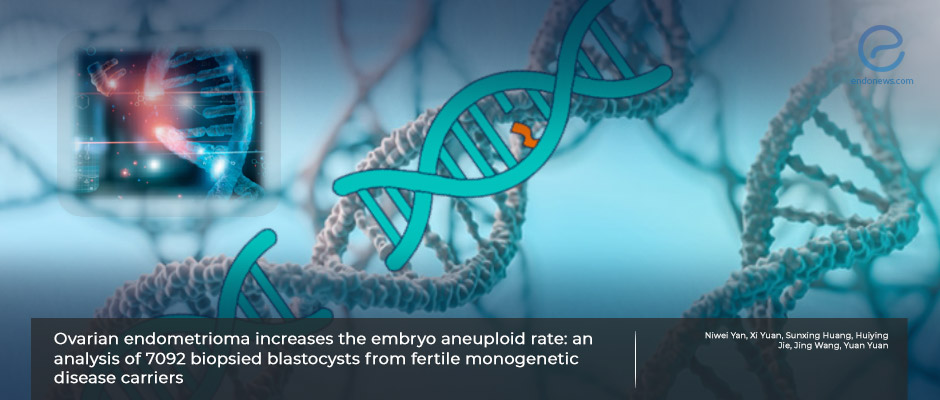Does ovarian endometrioma affect embryo aneuploidy rate in fertile women?
Jun 16, 2023
The embryo aneuploid rate of fertile patients was higher in women with ovarian endometrioma, despite normal oocyte maturation, fertilization, and early developmental processes.
Key Points
Highlights:
- Although the presence of ovarian endometrioma does not alter oocyte maturation, fertilization, and early development in fertile women, the aneuploid rate is significantly increased.
Importance:
- The disturbing effect of ovarian endometrioma on the aneuploid embryo rate is important.
What’s done here?
- This retrospective cohort study was conducted at a tertiary referral center to investigate the effect of ovarian endometrioma on oocyte maturation, fertilization, early development, and aneuploidy.
- Fertile patients who underwent preimplantation genetic testing for monogenic/single gene defects (PGT-M) with aneuploid screening were evaluated.
- Participants were divided into two groups: women with endometrioma and patients without any sign of endometriosis.
- All demographic characteristics were compared.
- The mature oocyte, fertilization, multipronuclear, cleavage, and blastocyst formation rates and euploid rate were calculated for each group and a comparison was performed.
Key results:
- A total of 1021 patients were enrolled, 53 patients (308 biopsied embryos) in the study group and 954 patients (6784 biopsied embryos) in the control group.
- PGT-M was performed for genetic abnormalities such as thalassemia, hemophilia, Duchenne’s muscular dystrophy, neurofibroma, spinal muscular atrophy, mucopolysaccharidosis, etc.
- There was no statistically significant difference between groups regarding age, BMI, and serum hormone levels, except serum basal follicle-stimulating hormone (FSH) level which was found to be significantly higher in the study group.
- The proportions of different stimulation protocols were similar.
- The mature oocyte, fertilization, multipronuclear, cleavage, and blastocyst formation rates were not different.
- The euploid rate of the study group was significantly lower than that of the control group.
- There was a negative relationship between euploid rate and endometriosis status according to multivariable linear regression analysis.
Strengths and Limitations:
- The homogeneous study population, inclusion of fertile patients having monogenetic disease carriers without an unpleasant pregnancy history, and large sample size were the main strengths.
- Being a single center-based retrospective study and inclusion of monogenetic disease carriers could be accepted as the limitations.
Lay Summary
One of the most common clinical findings of women with endometriosis is the decline in fertility status. These women often benefit from in vitro fertilization methods to become pregnant. However, whether there is a detrimental effect of endometriosis on oocyte and embryo development following in vitro fertilization treatments is a controversial issue.
A group of scientists under the leadership of Dr. Yuan from China published a study titled “Ovarian endometrioma increases the embryo aneuploid rate: an analysis of 7092 biopsied blastocysts from fertile monogenetic disease carriers” in BMC Women's Health.
The authors aimed to evaluate the euploid rate of embryos in fertile women with endometriosis undergoing PGT-M with aneuploid screening. The secondary outcomes of the study were the mature oocyte, fertilization, multipronuclear, cleavage, and blastocyst formation rates. Women in the study group (with endometrioma) and control group (without any signs of endometrioma) were similar concerning their age, BMI, and serum hormone levels, except for basal FSH level which was significantly higher in the study group. There was no significant difference regarding the mature oocyte, fertilization, multipronuclear, cleavage, and blastocyst formation rates.
However, the euploid rate of the study group was detected to be significantly lower than that of the control group. Multivariable linear regression also showed a negative relationship between euploid rate and endometriosis status.
“For infertile patients with endometrioma who require assisted reproductive treatment, pre-treatment is necessary to improve treatment outcomes.” the authors concluded.
Research Source: https://pubmed.ncbi.nlm.nih.gov/37161418/
endometriosis endometrioma oocyte embryo development aneuploid PGT-M

